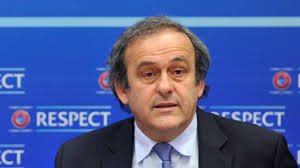By Andrew Warshaw
October 3 – UEFA president Michel Platini has broken his silence over FIFA’s refusal to publish the 430-page report into the bidding process for the 2018 and 2022 World Cups by saying he favours disclosure – but with the caveat that FIFA’s code of ethics is not breached.
Last week, FIFA made it clear it was not prepared to break the confidentiality pledges made to some 75 witnesses – including representatives of all nine bid candidates – who provided evidence and that therefore it could not authorise publication of former US attorney Michael Garcia’s report even though Garcia himself wants secrecy rules to be lifted for reasons of transparency.
German judge Hans-Joachim Eckert, head of the ethics committee’s adjudicatory arm, is currently considering the evidence and will announce his findings either in November or the spring. But Platini has now become the fourth FIFA vice-president to call for disclosure.
“I have no issue with the findings and recommendations being made available to the public,” Platini was quoted by CNN. “As long as the regulations of the FIFA code of ethics regarding the actual investigation are respected, I support the publishing of the report.”
FIFA awarded the 2018 and 2022 World Cups to Russia and Qatar respectively and it is the latter that has come under most scrutiny following allegations that former FIFA vice-president Mohamed bin Hammam, who was banned from football for life for a series of misdemeanours, paid football officials around the world in return for support for the bid.
A link between bin Hammam’s payments and the Qatar 2022 bid has not been proved.
Qatar 2022 officials insist bin Hammam had nothing to do with their campaign while others have made the point that bin Hammam’s alleged conduct was linked to his failed bid to become FIFA president.
After last week’s FIFA executive committee meeting, its legal director Marco Villiger told reporters confidentiality could prove difficult to sustain if the report was published.
“The code of ethics is based on certain principles, one of which is confidentiality,” Villiger said. “Cooperation between witnesses and the ethics committee is based on confidentiality; if not, perhaps certain witnesses, whistleblowers or other parties might not cooperate to such an extent.”
The clamour for publication has split opinion within FIFA’s inner sanctum. While newer exco members who did not vote at the time have called for full disclosure, former powerbrokers who took part in the December 2010, ballot and are still members have been less forthcoming and far more cautious, making few public statements.
Contact the writer of this story at moc.l1744971612labto1744971612ofdlr1744971612owedi1744971612sni@n1744971612osloh1744971612cin.l1744971612uap1744971612

